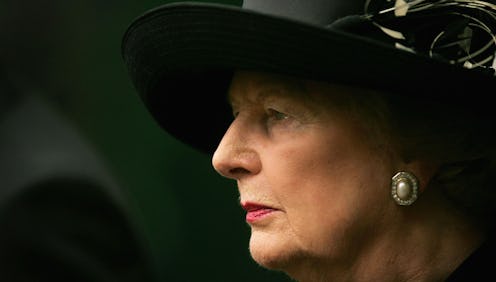Books
Did Mantel's Story About Thatcher Go Too Far?
When does a work of art go too far? It's a question that comes up over and over again in any society with freedom of expression, and it's one that's being raised most recently by Hilary Mantel's controversial short story "The Assasination of Margaret Thatcher — August 6th, 1983." The story is a fictionalized account of an assassination that never happened, and many are outraged Mantel would write such an account, especially since the former prime minister only died last year.
The short story, which was printed in The Guardian after the Daily Telegraph backed out of publishing it despite having paid a hefty sum for the rights to Mantel's next story, is written from the perspective of someone who unknowingly lets an IRA assassin into her apartment. As the strange man waits for Thatcher to leave an adjacent building and give him a clear shot, the two debate not whether or not the action is justified, but why it is justified. Whatever the reasons, however, the attempt is ultimately successful.
The story provoked outrage among many in Britain, with some calling it a "nasty and dangerous fantasy" and others saying Mantel, a two time Man Booker Prize-winner, is clearly "sick and deranged" for writing such a thing.
Mantel, for her part says that she thinks it's "unconscionable" to say that the subject shouldn't be examined simply because it's grim. She originally came up with the idea for the story while Thatcher was prime minister and the author happened to catch an unobstructed view of her through an apartment window. "I thought, if I wasn't me, if I was someone else, she'd be dead," Mantel told The Guardian. She has, in the past, made no secret of her detestation for Thatcher.
The story raises a lot of questions, questions about the respect or lack there of it is acceptable to show for public figures, about the ethics of suggesting a democratically elected official might be better off dead, about what (if anything) fall outside the jurisdiction of art, and about what to do with highly acclaimed writers who write shocking things. And, of course, it raises once again the question of what to do about Margaret Thatcher, one of the most polarizing figures Great Britain has ever seen.
Having read the story, I agree that it may be distasteful to many who supported — and continue to support the legacy of — Margaret Thatcher. Hatred for Thatcher is taken as a given in the story, and though the narrator does not initially know that the stranger at the door is there to kill the prime minister, this seemingly ordinary citizen does not seem particularly disturbed to learn about this plot. It is rather disturbing.
On the other hand, that may well be the point, and even if it wasn't Mantel's intention, the story doesn't inherently justify the actions of any of the characters. Though the narrator certainly feels this assassination is justified, stories (and authors) are not their narrators, nor is the take away of most stories supposed to be as simple as saying we should agree with the narrator. If that were true, Nabokov would be encouraging pedophilia, Albert Camus would be advocating for random murders, and let's not even get into what the recommendations of William Faulkner might be. Authors can portray awful things — horrific things even — and portray them with nuance and deep thought, without necessarily endorsing them.
In some ways, Mantel's story is reminiscent of Eudora Welty's short story "Where Is the Voice Coming From?" which she wrote just after the assassination of civil rights pioneer Medgar Evers, and which is narrated from the perspective of a white man who sets out to murder a fictionalized version of Evers. Although the story is from the murderer's perspective, Welty's purpose in writing the story was to demonstrate how awful this type of mindset is, and how it can lead to horrific things. Though Mantel's story is less explicitly intended to rebuke those who might have plotted to kill Margaret Thatcher, neither story is confined to a single interpretation. They are simply explorations of the type of circumstances that lead someone to commit a murder that they consider justified, whether or not the murder actually is.
Mantel's story is arguably disrespectful to Thatcher's family, coming as it does so soon after her death, but to call it dangerous or worthy of police investigation is to overlook the nuanced nature of art, and to confuse a character's actions or opinions as an endorsement from the author to do or believe certain things, which frankly is a dangerously simplistic attitude to have.
Margaret Thatcher was a polarizing figure in Britain, one who clearly still has the power to inspire passionate and conflicting feelings. And restricting artistic explorations of Thatcher and her legacy is counterproductive.
